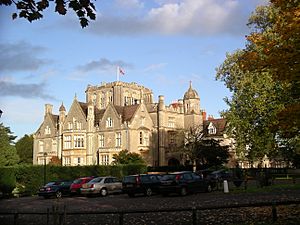Matthew Moreton, 1st Baron Ducie facts for kids
Matthew Ducie Moreton (born 1663, died 1735) was an important person in British history. He was a soldier and a politician. He served in the British Parliament, called the House of Commons, from 1708 to 1720. After that, he was given a special title and became Baron Ducie. At the time, it was quite rare for someone to have two first names like "Matthew-Ducie."
Early Life and Family
Matthew Ducie Moreton was born in 1663. He was the oldest son of Edward Moreton and Elizabeth Ducie. His family lived in places like Moreton in Staffordshire. His mother, Elizabeth, was important because she was the heir to her uncle, William Ducie. This meant that a large estate called Tortworth in Gloucestershire would eventually come into their family.
Matthew went to Queens' College, Cambridge, a famous university, in 1681 and finished his studies in 1682.
Military Service
Matthew Ducie Moreton joined the army in 1685. He started as a "cornet," which was a junior officer who carried the flag for a cavalry troop. He served during a time of conflict called the Monmouth Rebellion. After a battle called the Battle of Sedgemoor, his troop was disbanded.
In 1687, he joined another army group called the 3rd Dragoon Guards. He served in Flanders (an area that is now part of Belgium) during the time of King William III. His father passed away in 1687, and Matthew inherited his family's estates. He quickly rose through the ranks, becoming a captain by 1689 and a major in 1690. He married Arabella Prestwick in 1690. By 1694, he was a lieutenant colonel. He left the army between 1697 and 1702 after the war in Flanders ended.
After his military career, he served as a High Sheriff of Staffordshire from 1704 to 1705, and then as High Sheriff of Gloucestershire from 1705 to 1706. A High Sheriff was a very important local official.
Political Career
In 1708, Matthew Ducie Moreton was elected as a Member of Parliament (MP) for Gloucestershire. He was part of the Whig party, which was one of the main political groups at the time. He was very active in Parliament and supported the Whig party's ideas.
The election in 1710 was very close, but Matthew was elected again, even though some people disagreed with his views on the Church of England. However, he lost his seat in the 1713 election. He managed to win it back in 1715.
In 1717, he was given an important job as the vice-treasurer for Ireland. He also became an Irish Privy Councillor, which meant he was a trusted advisor to the King on Irish matters. In 1720, he was asked to leave his job so someone else could have it. As a way to make up for this, he was given a special title and became Baron Ducie on June 9, 1720. Because he was now a Baron, he had to leave his seat in the House of Commons.
Later Life
Lord Ducie passed away on May 2, 1735, at the age of 76. He was buried at Tortworth. He and his wife had three sons and four daughters. His son, also named Matthew, inherited his title. One of his daughters, Elizabeth, married Francis Reynolds. The later Barons Ducie came from their family line.
 | Aurelia Browder |
 | Nannie Helen Burroughs |
 | Michelle Alexander |


